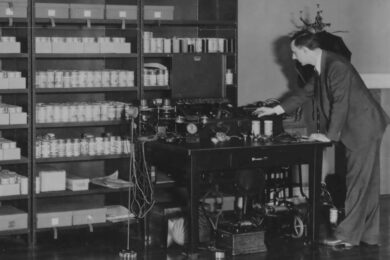Insert The Dirt: Or, how Times New Viking and No Age pour on the scuzz to remind you of good times past, by Louis Pattison
If the lessons of early ’90s alternative rock taught us anything, it is surely this: sounding like shit can sound great.
A few years back, I interviewed Jonathon Donohue and Grasshopper of Mercury Rev, and they talked at some length about the process of recording an album in America in the mid-’80s if you were a druggy film student with big ideas and minimal funds. At this point, you could break recording studios in the US into two vague categories: there were the big studios, where major label acts would hoover up the drugs and make some of the biggest and worst records of the ’80s – off limits, of course – and then, far, far beneath, there were the tin-pot studios recording country bands, tiny radio booths recording advertising jingles, and inspired amateurs.
"The way you found out how to record your little record with the $300 saved was by looking on the back of other people’s records," explained Donohue. "So you’d look on the back of a Minutemen record and go "Well they did it at this guy’s house, let’s do it with him’. And you’d phone up and speak to a guy who’d say "Well I don’t really know what I’m doing, but I’ll record ya" and it’d cost $90 and a couple of cases of beer. You’d have really bad studio hours, from midnight to seven in the morning. And that’s the way it really worked in America for the longest time." Mercury Rev’s debut album, Yerself Is Steam, was recorded over three years, during such night shifts, and the final mix was performed with the whole band at the mixing desk, toying with the faders. By all conventional logic, it should sound like an unfocused, mismatched, muddy disaster. It is not. It is very good indeed.
This then, was the story of pre-Nevermind alternative rock: great early records by Pavement, Sebadoh, and Dinosaur Jr that survive despite – no, prosper because of – the manner of their recording. Far from always being a hindrance, you see, lo-fidelity can actually have appealing effects: the buzz of a budget amplifier, the strangely comforting warmth of tape hiss, the screech of an incorrectly positioned microphone – all these things add up to a familiar, smudged, special sound: dirty, scuffed knee psychedelia, the ideal way to detune and drop out as the decade of the slick limped to a close.
Doesn’t this all sound a bit quaint in the brave new Noughties, when GarageBand is but a wireless mouse-click away, and everyone’s got a copy of Fruity Loops burnt on some CD-R somewhere for when they finally get around to making those grime tracks they’ve been promising? Ohio’s Times New Viking beg to differ. Their new album Rip It Off, due out on Matador this month, is a sort of conceptual salute to the beauty of nastily recorded scuzz. No one these days needs to design their record sleeve with a typewriter and glue and band photos run off on a shitty ink-jet printer. No one needs to record vocals through a microphone that reduces sweet boy/girl indie-pop songs to a ragged, scratchy caterwaul. No one needs to produce their record without a bass guitar and all the frequencies compressed into one hissy mid-range clang. But then, no one this year has made a record this plain fucking enjoyable, sixteen tousled, gap-toothed rascals that rap on the door, leave muddy footprints through your living room, and leave you beaming ear to ear. "Faces on fire and your hair is a mess/Let’s do something that hasn’t been done yet, sings vocalist/keyboardist Beth Murphy on ‘Faces On Fire’. It’s not the first time, but it’s every bit as fun.
Nouns, the new record by California’s No Age, feels cut from a similar cloth. Randy Randall and Dean Spunt are two hardcore kids from Hollywood who fell in L-U-V with scuzzy US lo-fi and the dreamy psychedelia of My Bloody Valentine. Newly ensconced on Sub Pop after their breakout EPs collection, Weirdo Rippers, they probably could have stepped into some flash studio with the guy who recorded Modest Mouse. Instead, thanks to a serious jones for anarcho-punks Crass, they recorded a couple of tracks at North London’s Southern Studios, and the rest in their own, defiantly unorthodox way. "We did it all on Pro Tools, which was new to us," explains Randy. "But we tried to do it in a way – you have to try to insert the dirt. We put a Dictaphone in the room with the drums – and the engineer was like, are you kidding me, that’s gonna sound like shit| and we were like, yes! That’s what we want, with the kickdrum blown and the cymbals all washed out and compressed through this tiny little speaker. Then we synch that up with nicer sounding drums and that – that was the sound we wanted."
The resultant smudge of thrashed snares, joyful harmonies, and whooshing, fuzzed-out guitars has a curiously My Bloody Valentine feel to it, actually – although not that sinking feeling Alan McGee surely got used to when the studio bill arrived. Nouns is a perfect example of lo-fidelity recording techniques not revived out of empty pockets, or even some dubious fetishisation of four-track recording, but that it sounds really neat. And that, of course, is all that really matters.
Mercury Rev – ‘Chasing a Bee’




